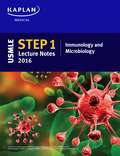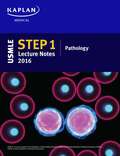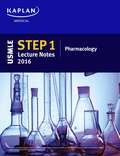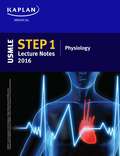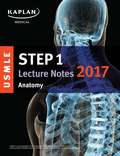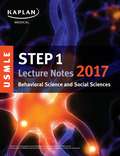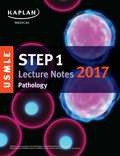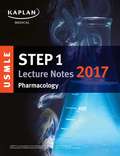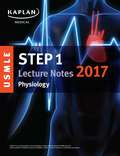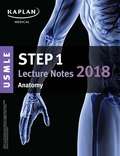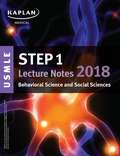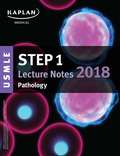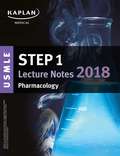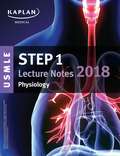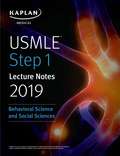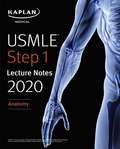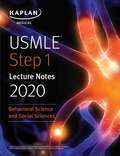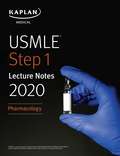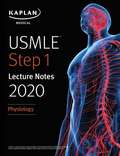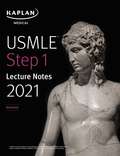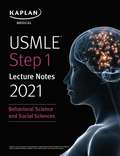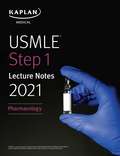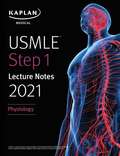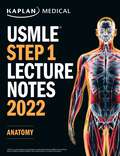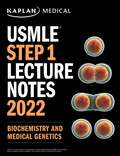- Table View
- List View
USMLE Step 1 Lecture Notes 2016: Immunology and Microbiology
by KaplanThe only official Kaplan Lecture Notes for USMLE Step 1 available for sale! Get the comprehensive information you need to ace USMLE Step 1 and match into the residency of your choice. * Up-to-date: Updated annually by Kaplan's all-star faculty * Integrated: Packed with clinical correlations and bridges between disciplines * Learner-efficient: Organized in outline format with high-yield summary boxes * Trusted: Used by thousands of students each year to succeed on USMLE Step 1
USMLE Step 1 Lecture Notes 2016: Pathology
by KaplanThe only official Kaplan Lecture Notes for USMLE Step 1 available for sale! Get the comprehensive information you need to ace USMLE Step 1 and match into the residency of your choice. * Up-to-date: Updated annually by Kaplan's all-star faculty * Integrated: Packed with clinical correlations and bridges between disciplines * Learner-efficient: Organized in outline format with high-yield summary boxes * Trusted: Used by thousands of students each year to succeed on USMLE Step 1
USMLE Step 1 Lecture Notes 2016: Pharmacology
by KaplanThe only official Kaplan Lecture Notes for USMLE Step 1 available for sale! Get the comprehensive information you need to ace USMLE Step 1 and match into the residency of your choice. * Up-to-date: Updated annually by Kaplan's all-star faculty * Integrated: Packed with clinical correlations and bridges between disciplines * Learner-efficient: Organized in outline format with high-yield summary boxes * Trusted: Used by thousands of students each year to succeed on USMLE Step 1
USMLE Step 1 Lecture Notes 2016: Physiology
by KaplanThe only official Kaplan Lecture Notes for USMLE Step 1 available for sale! Get the comprehensive information you need to ace USMLE Step 1 and match into the residency of your choice. * Up-to-date: Updated annually by Kaplan's all-star faculty * Integrated: Packed with clinical correlations and bridges between disciplines * Learner-efficient: Organized in outline format with high-yield summary boxes * Trusted: Used by thousands of students each year to succeed on USMLE Step 1
USMLE Step 1 Lecture Notes 2017: Anatomy
by Kaplan MedicalThe only official Kaplan Lecture Notes for USMLE Step 1 cover the comprehensive information you need to ace the exam and match into the residency of your choice. * Up-to-date: Updated annually by Kaplan’s all-star faculty * Integrated: Packed with clinical correlations and bridges between disciplines * Learner-efficient: Organized in outline format with high-yield summary boxes * Trusted: Used by thousands of students each year to succeed on USMLE Step 1
USMLE Step 1 Lecture Notes 2017: Behavioral Science and Social Sciences
by Kaplan MedicalThe only official Kaplan Lecture Notes for USMLE Step 1 cover the comprehensive information you need to ace the exam and match into the residency of your choice. * Up-to-date: Updated annually by Kaplan’s all-star faculty. This edition includes a section on Patient Safety Science, a topic that was recently added to the exam. * Integrated: Packed with clinical correlations and bridges between disciplines * Learner-efficient: Organized in outline format with high-yield summary boxes * Trusted: Used by thousands of students each year to succeed on USMLE Step 1
USMLE Step 1 Lecture Notes 2017: Pathology
by Kaplan MedicalThe only official Kaplan Lecture Notes for USMLE Step 1 cover the comprehensive information you need to ace the exam and match into the residency of your choice. * Up-to-date: Updated annually by Kaplan’s all-star faculty * Integrated: Packed with clinical correlations and bridges between disciplines * Learner-efficient: Organized in outline format with high-yield summary boxes * Trusted: Used by thousands of students each year to succeed on USMLE Step 1
USMLE Step 1 Lecture Notes 2017: Pharmacology
by Kaplan MedicalThe only official Kaplan Lecture Notes for USMLE Step 1 cover the comprehensive information you need to ace the exam and match into the residency of your choice. * Up-to-date: Updated annually by Kaplan’s all-star faculty * Integrated: Packed with clinical correlations and bridges between disciplines * Learner-efficient: Organized in outline format with high-yield summary boxes * Trusted: Used by thousands of students each year to succeed on USMLE Step 1
USMLE Step 1 Lecture Notes 2017: Physiology
by Kaplan MedicalThe only official Kaplan Lecture Notes for USMLE Step 1 cover the comprehensive information you need to ace the exam and match into the residency of your choice. * Up-to-date: Updated annually by Kaplan’s all-star faculty * Integrated: Packed with clinical correlations and bridges between disciplines * Learner-efficient: Organized in outline format with high-yield summary boxes * Trusted: Used by thousands of students each year to succeed on USMLE Step 1
USMLE Step 1 Lecture Notes 2018: Anatomy
by Kaplan MedicalKaplan Medical's USMLE Step 1 Lecture Notes 2018: Anatomy offers in-depth review with a focus on high-yield topics – a comprehensive approach that will help you deepen your understanding while focusing your efforts where they'll count the most.Used by thousands of medical students each year to succeed on USMLE Step 1, Kaplan's official lecture notes are packed with full-color diagrams and clear review.The Best ReviewOrganized in outline format with high-yield summary boxes for efficient study.Clinical correlations and bridges between disciplines highlighted throughout.Full-color diagrams and charts for better comprehension and retention.Updated annually by Kaplan's all-star expert facultyLooking for more prep? Our USMLE Step 1 Lecture Notes 2018: 7-Book Set has this book, plus the rest of the 7-book series.
USMLE Step 1 Lecture Notes 2018: Behavioral Science and Social Sciences
by Kaplan MedicalKaplan Medical's USMLE Step 1 Lecture Notes 2018: Behavioral Science and Social Sciences offers in-depth review with a focus on high-yield topics – a comprehensive approach that will help you deepen your understanding while focusing your efforts where they'll count the most.Used by thousands of medical students each year to succeed on USMLE Step 1, Kaplan's official lecture notes are packed with full-color diagrams and clear review. This edition includes a section on Patient Safety Science, a topic that was recently added to the exam.The Best ReviewOrganized in outline format with high-yield summary boxes for efficient study.Clinical correlations and bridges between disciplines highlighted throughout.Full-color diagrams and charts for better comprehension and retention.Updated annually by Kaplan's all-star expert facultyLooking for more prep? Our USMLE Step 1 Lecture Notes 2018: 7-Book Set has this book, plus the rest of the 7-book series.
USMLE Step 1 Lecture Notes 2018: Pathology
by Kaplan MedicalKaplan Medical's USMLE Step 1 Lecture Notes 2018: Pathology offers in-depth review with a focus on high-yield topics – a comprehensive approach that will help you deepen your understanding while focusing your efforts where they'll count the most.Used by thousands of medical students each year to succeed on USMLE Step 1, Kaplan's official lecture notes are packed with full-color diagrams and clear review.The Best ReviewOrganized in outline format with high-yield summary boxes for efficient study.Clinical correlations and bridges between disciplines highlighted throughout.Full-color diagrams and charts for better comprehension and retention.Updated annually by Kaplan's all-star expert facultyLooking for more prep? Our USMLE Step 1 Lecture Notes 2018: 7-Book Set has this book, plus the rest of the 7-book series.
USMLE Step 1 Lecture Notes 2018: Pharmacology
by Kaplan MedicalKaplan Medical's USMLE Step 1 Lecture Notes 2018: Pharmacology offers in-depth review with a focus on high-yield topics – a comprehensive approach that will help you deepen your understanding while focusing your efforts where they'll count the most.Used by thousands of medical students each year to succeed on USMLE Step 1, Kaplan's official lecture notes are packed with full-color diagrams and clear review.The Best ReviewOrganized in outline format with high-yield summary boxes for efficient study.Clinical correlations and bridges between disciplines highlighted throughout.Full-color diagrams and charts for better comprehension and retention.Updated annually by Kaplan's all-star expert facultyLooking for more prep? Our USMLE Step 1 Lecture Notes 2018: 7-Book Set has this book, plus the rest of the 7-book series.
USMLE Step 1 Lecture Notes 2018: Physiology
by Kaplan MedicalKaplan Medical's USMLE Step 1 Lecture Notes 2018: Physiology offers in-depth review with a focus on high-yield topics – a comprehensive approach that will help you deepen your understanding while focusing your efforts where they'll count the most.Used by thousands of medical students each year to succeed on USMLE Step 1, Kaplan's official lecture notes are packed with full-color diagrams and clear review.The Best ReviewOrganized in outline format with high-yield summary boxes for efficient study.Clinical correlations and bridges between disciplines highlighted throughout.Full-color diagrams and charts for better comprehension and retention.Updated annually by Kaplan's all-star expert facultyLooking for more prep? Our USMLE Step 1 Lecture Notes 2018: 7-Book Set has this book, plus the rest of the 7-book series.
USMLE Step 1 Lecture Notes 2019: Behavioral Science and Social Sciences (Kaplan Test Prep)
by Kaplan MedicalThe only official Kaplan Lecture Notes for USMLE Step 1 cover the comprehensive information you need to ace the exam and match into the residency of your choice.Up-to-date: Updated annually by Kaplan’s all-star facultyIntegrated: Packed with clinical correlations and bridges between disciplinesLearner-efficient: Organized in outline format with high-yield summary boxesTrusted: Used by thousands of students each year to succeed on USMLE Step 1Looking for more prep? Our USMLE Step 1 Lecture Notes 2019: 7-Book Set has this book, plus the rest of the 7-book series.
USMLE Step 1 Lecture Notes 2020: Anatomy (Kaplan Test Prep)
by Kaplan MedicalThe only official Kaplan Lecture Notes for USMLE Step 1 cover the comprehensive information you need to ace the exam and match into the residency of your choice.Up-to-date: Updated annually by Kaplan&’s all-star facultyIntegrated: Packed with clinical correlations and bridges between disciplinesLearner-efficient: Organized in outline format with high-yield summary boxesTrusted: Used by thousands of students each year to succeed on USMLE Step 1Looking for more prep? Our USMLE Step 1 Lecture Notes 2018: 7-Book Set has this book, plus the rest of the 7-book series.
USMLE Step 1 Lecture Notes 2020: Behavioral Science and Social Sciences (Kaplan Test Prep)
by Kaplan MedicalThe only official Kaplan Lecture Notes for USMLE Step 1 cover the comprehensive information you need to ace the exam and match into the residency of your choice. * Up-to-date: Updated annually by Kaplan&’s all-star faculty. This edition includes a section on Patient Safety Science, a topic that was recently added to the exam. * Integrated: Packed with clinical correlations and bridges between disciplines * Learner-efficient: Organized in outline format with high-yield summary boxes * Trusted: Used by thousands of students each year to succeed on USMLE Step 1 Looking for more prep? Our USMLE Step 1 Lecture Notes 2018: 7-Book Set has this book, plus the rest of the 7-book series.
USMLE Step 1 Lecture Notes 2020: Pharmacology (Kaplan Test Prep)
by Kaplan MedicalThe only official Kaplan Lecture Notes for USMLE Step 1 cover the comprehensive information you need to ace the exam and match into the residency of your choice. * Up-to-date: Updated annually by Kaplan&’s all-star faculty * Integrated: Packed with clinical correlations and bridges between disciplines * Learner-efficient: Organized in outline format with high-yield summary boxes * Trusted: Used by thousands of students each year to succeed on USMLE Step 1 Looking for more prep? Our USMLE Step 1 Lecture Notes 2018: 7-Book Set has this book, plus the rest of the 7-book series.
USMLE Step 1 Lecture Notes 2020: Physiology (Kaplan Test Prep)
by Kaplan MedicalThe only official Kaplan Lecture Notes for USMLE Step 1 cover the comprehensive information you need to ace the exam and match into the residency of your choice. * Up-to-date: Updated annually by Kaplan&’s all-star faculty * Integrated: Packed with clinical correlations and bridges between disciplines * Learner-efficient: Organized in outline format with high-yield summary boxes * Trusted: Used by thousands of students each year to succeed on USMLE Step 1 Looking for more prep? Our USMLE Step 1 Lecture Notes 2018: 7-Book Set has this book, plus the rest of the 7-book series.
USMLE Step 1 Lecture Notes 2021: Anatomy (USMLE Prep)
by Kaplan MedicalThe only official Kaplan Lecture Notes for USMLE Step 1 cover the comprehensive information you need to ace the exam and match into the residency of your choice.Up-to-date: Updated annually by Kaplan&’s all-star facultyIntegrated: Packed with clinical correlations and bridges between disciplinesLearner-efficient: Organized in outline format with high-yield summary boxesTrusted: Used by thousands of students each year to succeed on USMLE Step 1Looking for more prep? Our USMLE Step 1 Lecture Notes 2018: 7-Book Set has this book, plus the rest of the 7-book series.
USMLE Step 1 Lecture Notes 2021: Behavioral Science and Social Sciences (USMLE Prep)
by Kaplan MedicalThe only official Kaplan Lecture Notes for USMLE Step 1 cover the comprehensive information you need to ace the exam and match into the residency of your choice. * Up-to-date: Updated annually by Kaplan&’s all-star faculty. This edition includes a section on Patient Safety Science, a topic that was recently added to the exam. * Integrated: Packed with clinical correlations and bridges between disciplines * Learner-efficient: Organized in outline format with high-yield summary boxes * Trusted: Used by thousands of students each year to succeed on USMLE Step 1 Looking for more prep? Our USMLE Step 1 Lecture Notes 2018: 7-Book Set has this book, plus the rest of the 7-book series.
USMLE Step 1 Lecture Notes 2021: Pharmacology (USMLE Prep)
by Kaplan MedicalThe only official Kaplan Lecture Notes for USMLE Step 1 cover the comprehensive information you need to ace the exam and match into the residency of your choice. * Up-to-date: Updated annually by Kaplan&’s all-star faculty * Integrated: Packed with clinical correlations and bridges between disciplines * Learner-efficient: Organized in outline format with high-yield summary boxes * Trusted: Used by thousands of students each year to succeed on USMLE Step 1 Looking for more prep? Our USMLE Step 1 Lecture Notes 2018: 7-Book Set has this book, plus the rest of the 7-book series.
USMLE Step 1 Lecture Notes 2021: Physiology (USMLE Prep)
by Kaplan MedicalThe only official Kaplan Lecture Notes for USMLE Step 1 cover the comprehensive information you need to ace the exam and match into the residency of your choice. * Up-to-date: Updated annually by Kaplan&’s all-star faculty * Integrated: Packed with clinical correlations and bridges between disciplines * Learner-efficient: Organized in outline format with high-yield summary boxes * Trusted: Used by thousands of students each year to succeed on USMLE Step 1 Looking for more prep? Our USMLE Step 1 Lecture Notes 2018: 7-Book Set has this book, plus the rest of the 7-book series.
USMLE Step 1 Lecture Notes 2022: Anatomy (USMLE Prep #2019)
by Kaplan MedicalThe only official Kaplan Lecture Notes for USMLE Step 1 cover the comprehensive information you need to ace the exam and match into the residency of your choice. * Up-to-date: Updated annually by Kaplan&’s all-star faculty * Integrated: Packed with clinical correlations and bridges between disciplines * Learner-efficient: Organized in outline format with high-yield summary boxes * Trusted: Used by thousands of students each year to succeed on USMLE Step 1 Looking for more prep? Our USMLE Step 1 Lecture Notes 2022: 7-Book Set has this book, plus the rest of the 7-book series.
USMLE Step 1 Lecture Notes 2022: Biochemistry and Medical Genetics (USMLE Prep)
by Kaplan MedicalThe only official Kaplan Lecture Notes for USMLE Step 1 cover the comprehensive information you need to ace the exam and match into the residency of your choice. * Up-to-date: Updated annually by Kaplan&’s all-star faculty * Integrated: Packed with clinical correlations and bridges between disciplines * Learner-efficient: Organized in outline format with high-yield summary boxes * Trusted: Used by thousands of students each year to succeed on USMLE Step 1 Looking for more prep? Our USMLE Step 1 Lecture Notes 2022: 7-Book Set has this book, plus the rest of the 7-book series.
